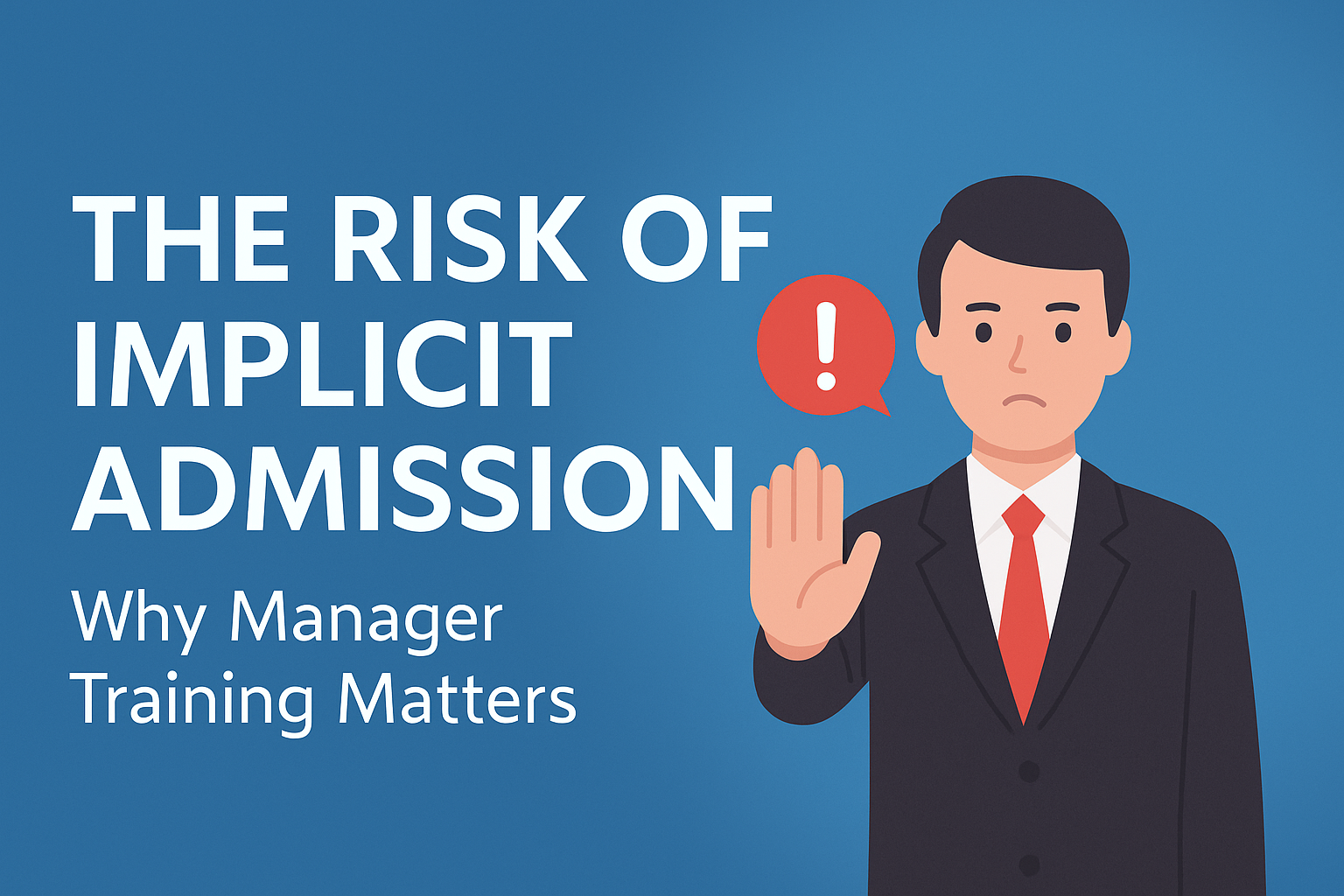The Risk of Implicit Admission: Why Manager Training Matters

In today’s complex workplace environment, managers are not just supervisors—they are company representatives whose words and actions carry legal weight. A single statement made in a moment of empathy or frustration can unintentionally expose an employer to significant liability.
That’s why manager training is so critical. When leaders understand how their communication can be interpreted legally, they can respond more effectively to employee concerns while protecting both themselves and the organization.
At JTS HR Consulting, I provide training that helps managers recognize and avoid these risks—teaching them how to communicate with professionalism, empathy, and legal awareness. One of the most overlooked areas covered in that training is the concept of implicit admission.
What Is Implicit Admission?
An implicit admission occurs when a person’s words or behavior suggest agreement with or acceptance of another person’s statement, even if they never directly confirm it. In the employment context, this can happen when a manager responds to an employee’s allegation in a way that seems to validate it.
Example:
An employee says, “You’re only giving me fewer shifts because of my age.” If the manager replies, “You’ve been here a long time; you understand how we do things,” that comment could be interpreted as confirming the employee’s claim—even if the manager had no such intent.
Courts can view such remarks as evidence of an admission by the employer, since managers often act as agents of the company.
The Legal Impact of Implicit Admissions
Under the Federal Rules of Evidence, statements made by a company’s representative may be considered admissions by the company itself. This means a manager’s offhand comment—made in the heat of a difficult conversation—could later appear in court or a formal investigation as evidence of guilt or wrongdoing.
Implicit admissions can surface in many employment-related claims, including:
- Discrimination or retaliation (e.g., “I know it’s unfair, but the decision came from above.”)
- Harassment complaints (e.g., “He shouldn’t have said that to you.”)
- Injury or negligence cases (e.g., “We should’ve fixed that before someone got hurt.”)
- Termination or discipline meetings (e.g., “I didn’t want to let you go, but I had to.”)
Even seemingly kind or sympathetic responses can be misinterpreted as an acknowledgment of fault. Once spoken, those words cannot easily be taken back.
How Managers Accidentally Give Implicit Admission
Implicit admissions often arise from good intentions. Many managers want to smooth over conflict, express understanding, or offer reassurance. Unfortunately, these instincts can backfire when the words imply responsibility.
Common mistakes include:
- Apologizing for events without clarifying that the apology is for the experience, not the alleged action (“I’m sorry this happened” instead of “I’m sorry you feel upset about this situation.”)
- Speculating about company actions (“HR probably thought it was for the best.”)
- Trying to empathize through agreement (“You’re right, that policy doesn’t seem fair.”)
- Failing to respond clearly to serious accusations, which may be read as agreement through silence.
How to Avoid Implicit Admission
Managers don’t have to sacrifice empathy to stay compliant. The key is knowing how to communicate in difficult moments.
- Stay Neutral but Supportive
- Say: “I understand this is upsetting. Let’s make sure it’s reviewed properly.”
- Avoid: “You’re right, that shouldn’t have happened.”
- Focus on Process, Not Opinion
- Say: “I’ll ensure HR reviews this in line with company policy.”
- Avoid: “That sounds illegal” or “That was a bad call.”
- Don’t Guess or Assume
- Never speak on behalf of HR, legal, or other departments unless authorized. It’s better to say, “I’ll find out and get back to you,” than to offer an off-the-cuff opinion.
- Document and Refer
- When an employee raises a concern, document the interaction and immediately refer it to HR. A clear paper trail protects everyone involved.
- Receive Regular Training
- Communication pitfalls evolve along with workplace laws. Annual training helps ensure managers know how to handle sensitive conversations with clarity and compliance.
The HR Perspective: Why It Matters
From an HR standpoint, implicit admissions are one of the most preventable legal risks employers face. They typically don’t come from malicious intent—they come from untrained communication. A well-meaning manager who tries to “be honest” or “make things right” may unintentionally make things worse by framing the situation in a way that legally harms the company.
Investing in communication and compliance training helps managers:
- Understand how to respond to complaints or allegations safely
- Build trust through professionalism, not promises
- Protect the integrity of investigations
- Avoid statements that could later be used as evidence against the employer
Protecting Your Organization Through Training
Implicit admission training is more than just a legal safeguard—it’s a professional development tool that helps leaders handle difficult conversations with skill and confidence.
At JTS HR Consulting, I teach managers how to:
- Recognize risk in everyday conversations
- Communicate empathy without liability
- Balance compassion with compliance
- Support HR investigations appropriately
By training managers in these techniques, companies reduce exposure to risk while strengthening trust and transparency across teams.
Final Thoughts
An employer’s legal exposure often begins not with action, but with a statement made in good faith. Understanding the concept of implicit admission helps managers avoid unintentional missteps that can later be construed as acknowledgment of wrongdoing.
Effective training gives managers the tools they need to respond thoughtfully, document properly, and communicate responsibly—protecting both employees and the organization.
Ready to safeguard your organization through better manager communication?
Contact Julie Soltes at JTS HR Consulting to schedule training on Avoiding Implicit Admission and Communicating with Legal Awareness.
